No, cats cannot eat garlic as it is highly toxic.
Any amount of garlic can cause a negative reaction including gastrointestinal problems and garlic poisoning so cats should not eat any garlic or foods that contain garlic.
Garlic comes from the same family as chives, leeks and onions, all of which are toxic to cats but garlic is the most potent due to an oxidant called n-propyl disulfide.
When this oxidant comes into contact with red blood cells it causes oxidative damage and leads to anaemia.
Contents
Is Garlic Toxic To Cats?
Yes, garlic is toxic to cats and is five times more toxic to them than onions.
If your cat eats some garlic they may experience garlic poisoning as their body does not have the amount of sulphur-containing amino acids required to detoxify the toxins in garlic.
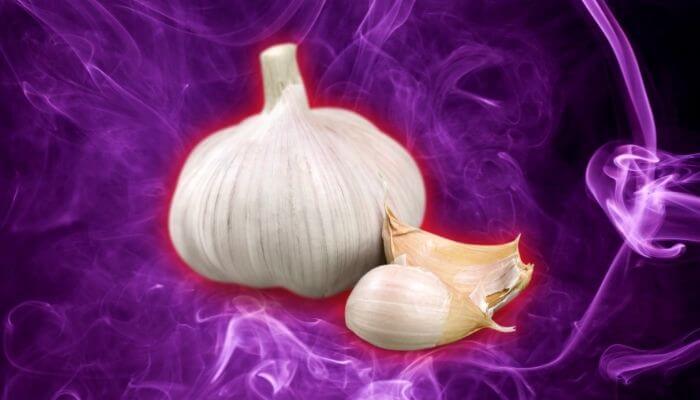
Due to this, the chemicals that are found in garlic enter your cat’s bloodstream and rupture their red blood cells which leads to hemolytic anaemia.
The breakdown of red blood cells can also cause damage to the kidneys and nervous system.
Garlic is also toxic to dogs although cats are more sensitive to it.
Can Garlic Be Fatal To Cats?
Yes, garlic can be fatal to cats.
Severe or prolonged garlic poisoning may require IV fluid, supplemental oxygen, or a blood transfusion to treat.
There are also a number of possible complications related to severe garlic poisoning such as anaemia.
If your cat has hemolytic anaemia it means they don’t have enough red blood cells in the body and this leads to a number of other health issues.

With that said, the prognosis of garlic poisoning is generally good as long as the cat hasn’t eaten too much garlic and the treatment was not considerably delayed.
How Much Garlic Could Kill A Cat?
Any amount of garlic can negatively impact your cat’s health.
It’s thought that 5 grams of onion per kg can cause toxicity in cats and garlic is about 5 times more toxic than onion so just 1 gram of garlic could have a serious impact on their health.

With that said, a cat’s susceptibility to garlic poisoning really depends on the amount of garlic consumed and the cat’s health, breed, and size but all cats are at risk.
Some breeds may be more sensitive than others and cats with other health issues may be less able to handle even very small amounts of garlic.
Garlic is unlikely to kill a cat but severe cases of garlic toxicity that are left untreated can lead to organ damage, organ failure, and death.
Garlic Poisoning Symptoms
If you think your cat has eaten garlic, contact your vet immediately.
You may see some of the following symptoms, but keep in mind, some of the more severe symptoms of garlic poisoning can take a couple of days to show:
- Vomiting
- Breathing difficulties
- Diarrhoea
- Drooling
- Loss of appetite
- Lethargy
- Increased heart rate
- Increased respiratory rate
- Pale gums
- Weakness
- Collapse
As mentioned above, some of these symptoms can take hours or days to set in, particularly those that are related to anaemia (e.g. pale gums, weakness, lethargy).
If you know your cat has eaten garlic don’t wait until you see symptoms to contact a vet.
The earlier your cat can be treated, the better.
What To Do If Your Cat Has Eaten Garlic?
If you think your cat has eaten garlic, contact your vet immediately.
If your cat has eaten garlic we recommend you speak with a vet ASAP.
JustAnswer allows you to talk in real-time to veterinary experts for a small fee.
Depending on the amount of garlic your cat ate, the vet may recommend you bring the cat to the clinic or they may advise you to closely monitor your cat for signs of a reaction to the garlic such as an upset stomach.
If you are advised to take your cat to the clinic your vet may induce vomiting to get the garlic out of their system.
They may then give your cat activated charcoal to help absorb the toxins already in your cat’s body.
If your cat has eaten a lot of garlic or is having a severe reaction, they may need IV fluids or oxygen therapy.
How Is Garlic Poisoning Treated?
The treatment will depend on when your cat ate the garlic, how much garlic they ate and their response to it.
The vet might treat garlic poisoning by administering a hydrogen peroxide solution to induce vomiting and remove the undigested garlic from your cat’s stomach.
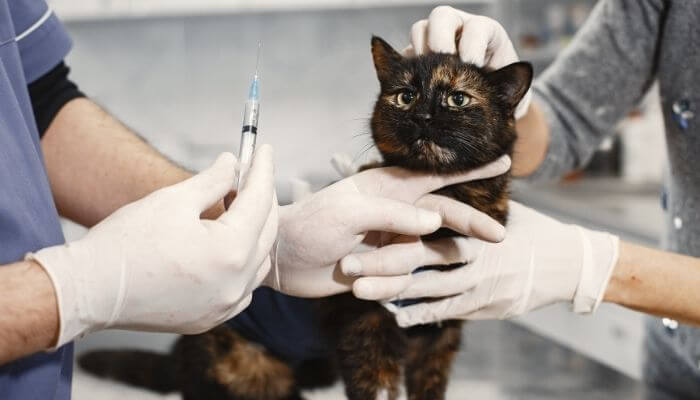
Vets may also perform a stomach wash to make sure all the toxins have been removed. Activated charcoal could also be administered to help absorb toxins and stop them from entering your cat’s bloodstream.
Your cat’s condition will then be monitored and, if necessary, the vet will administer supportive care such as oxygen therapy or IV fluids.
Giving IV fluids for garlic poisoning is relatively common as it prevents dehydration and cats with garlic poisoning often vomit or have diarrhoea so need extra fluids.
If the garlic poisoning is severe, your cat may need a blood transfusion but this is rare.
Do Cats Like Garlic?
No, as garlic has a strong smell which cats usually hate.
If a cat has ingested garlic it is more likely that the garlic has been used as an ingredient and mixed into a dish rather than a garlic clove that has been eaten on its own.

While cats probably don’t like garlic, they may still try to eat some if they aren’t familiar with it. We’ve heard stories of curious cats who have tried to eat a cooked garlic clove when they saw the opportunity.
It’s important to note that all forms of garlic, including garlic powder, is toxic for cats.
Most cats won’t eat raw garlic but as garlic is a common ingredient it’s important to be very careful with what food you are offering them.
A few scraps from the table might seem harmless but it could make your cat sick.
Can Cats Eat Garlic Bread?
No, garlic bread is not safe to give to cats.
Even a small amount can cause severe side effects that require veterinary attention.
This is because garlic is highly toxic for your cat to eat and it can cause garlic poisoning.
If your cat eats garlic bread, contact your vet immediately.
Contact your vet even if your cat seems fine as it can take a couple of days until the symptoms of garlic poisoning are visible.
Bread is not dangerous for cats but it isn’t recommended simply because cats don’t need carbohydrates and the bread doesn’t offer them any nutritional benefits.
Feeding your cat things like bread is likely to contribute to weight gain and obesity.
The garlic is the main problem in garlic bread but, for the health and wellbeing of your cat, it’s best to stick to offering them cat treats and meat treats rather than “human food”.
Does Garlic Help Get Rid Of Fleas?
No, using garlic to help get rid of fleas is not only unreliable it also puts your cat at risk.
Garlic is sometimes thought of as a good, natural way to get rid of fleas but it is not worth the risk.
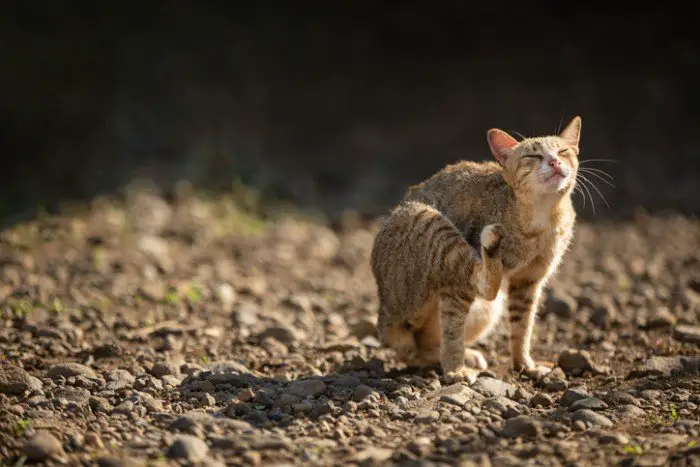
If you are looking for a home remedy for fleas, garlic is not the answer.
There are some commercial supplements and treatments that include garlic within the ingredients but these should be avoided.
Other treatment options are much more effective than garlic and don’t come with the risk of toxicity.
Instead of garlic, choose a safe and effective flea treatment such as flea shampoo, spot-on treatment, flea sprays/powders.
Are There Any Benefits To Adding Small Amounts Of Garlic To Your Cat’s Diet?
No, adding garlic to your cat’s food will always cause more damage than good.
Cats are sensitive to garlic, it can cause poisoning and regularly adding small amounts of garlic to your cat’s food can cause anaemia and digestive issues.
Be very careful when choosing which dietary supplements you are giving your cat as some contain garlic.
There’s no reason to take the risk as any benefits garlic could offer can be found in safer alternatives.

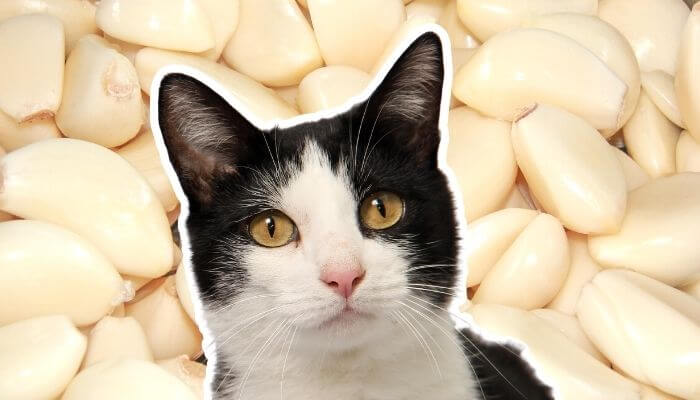
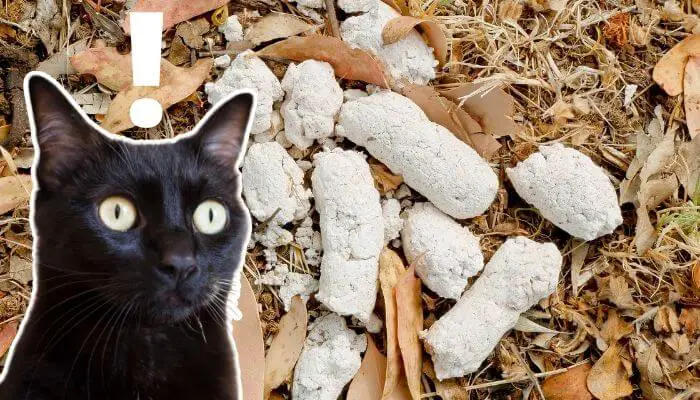
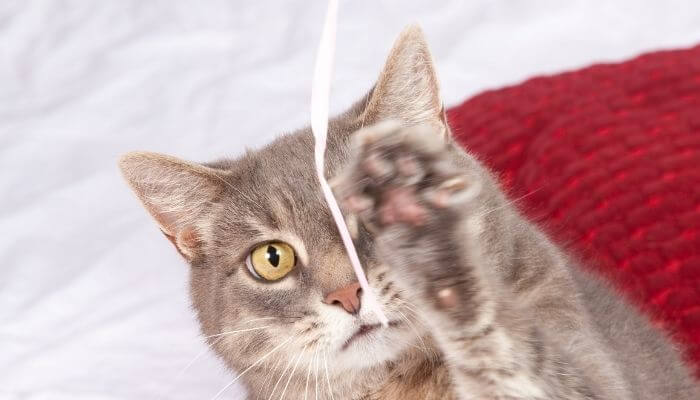
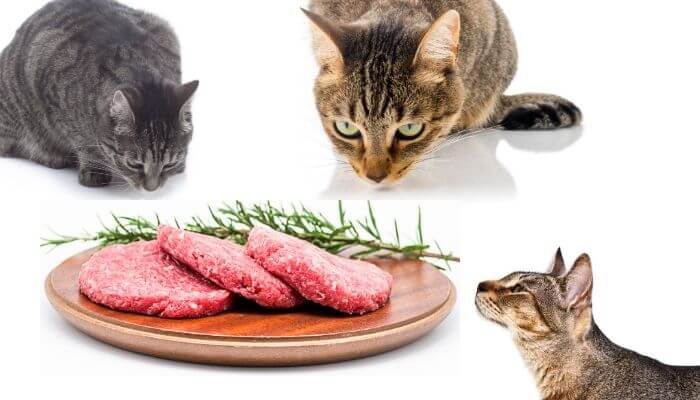
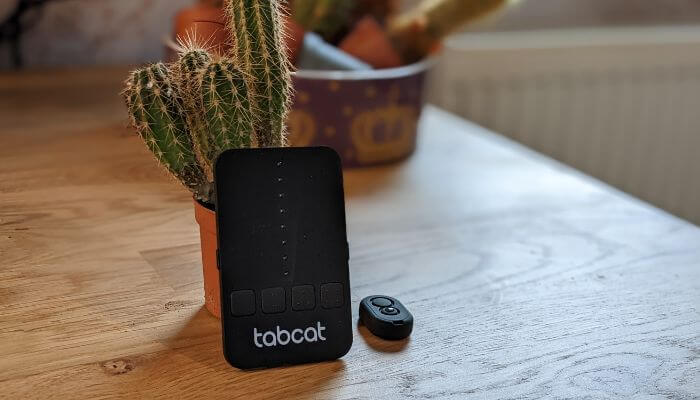

Leave a Comment